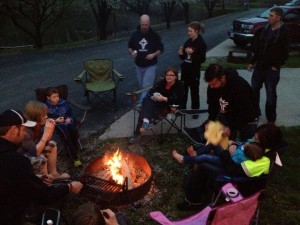Here’s a quick thought I would like to share with you all, specifically my pastoral and ministerial friends, but everyone else is welcome to listen in if you would like.
I’ve been reading through 1 Thessalonians as a part of my quiet time and never realized how great a manual it is a conflict management within the church. Even though I know there are others who have lived in far greater conflict than I have, I am no stranger to the difficulties of life within the church.
As a young preacher with a very pregnant spouse sitting in the congregation I have had the microphone taken from my hand and then told that my work for the Lord was the same as that of the terrorists who destroyed the twin towers.
I have been screamed at on a Sunday morning in the church foyer after changing the lights out on a workday with the claim that I have created the “abomination of desolation” and desecrated the temple.
I cannot even begin to tell you how much bad theology is in the last statement, but it doesn’t matter… it all still hurts.
Managing conflict in the church is no different than managing conflict anywhere else, but it stings more when you realize that God’s people should act more… well,Godly toward one another.
Paul was writing to the church in Thessalonica knowing that his integrity had been questioned and his motives had been lied about in his absence. There were men in that congregation who are trying to destroy him at a distance.
Now, if I were Paul, I would’ve dropped the apostle card and sent some people directly to hell, do not pass go, do not collect $200. Probably a good thing I’m not an apostle, eh?
Paul’s response is… amazing! As pastors and ministry leaders, when we are attacked or come under fire, we know we are to follow the Matthew 18 principle and go to the offender one-on-one before we go to them with a caring brother sister and long before we take them before the church.
But, what Paul does here supersedes any of that. It’s an attitude that he displays on his own part that takes Christian love to a whole ‘nutha level. So how did Paul deal with conflict in the church at the attitudinal level:
First, find your position of thankfulness.
2 Thessalonians 2:13 And we also thank God constantly for this, that when you received the word of God, which you heard from us, you accepted it not as the word of men but as what it really is, the word of God, which is at work in you believers.
The first thing he did to this gossiping, backbiting, character devouring group of people was share that he thanked God for them constantly. If it wasn’t in the Bible, I would think he is lying. But look closely, he is thankful not necessarily for them, or even their relationship… He find something to be thankful for: he is thankful for what God is doing in them.
Sometimes you have to look hard, but there’s always something to be thankful for. And even if someone is being difficult, ugly and out of God’s will, we can still be thankful that God has not given up on them and is using, even these moments, to shape them for what they could be in the future.
Second, don’t give up on intimacy with them.
Second Thessalonians 2:17 But since we were torn away from you, brothers, for a short time, in person not in heart, we endeavored the more eagerly and with great desire to see you face to face, 18 because we wanted to come to you—I, Paul, again and again—but Satan hindered us.
The language Paul uses here for these people who were being ugly and difficult looks more like a junior high schooler’s puppy love statements about someone he met in band camp and can’t bear to be apart from them:
- 1 Torn away
- 2 Endeavored
- 3 More eagerly
- 4 Great desire
- 5 Face-to-face
- 6 I, Paul, again and again
This man obviously believed that these difficult people were still his brothers and sisters, and that he strongly desired to be near them. Most of the time we do just the opposite, the minute conflict erupts we run the other way and start disconnecting from them at every level. I think we really have something to learn from Paul here.
Third, never forget who the enemy is.
2 Thessalonians 2:18 because we wanted to come to you—I, Paul, again and again—but Satan hindered us.
This is a huge, monsterously big, relationship changing, life altering realization… when you’re in conflict with someone else they aren’t the enemy. The issue is not the issue. The problem is the devil.
If we can remember that every hurt feeling, every skirmish over politicking issues and every stupid thing said or done is the product of the one who wants us to be divided. If we can remember this, we can make him the target and not one another.
I hope this is helpful, because conflict is going to be in each one of our lives. But, if we can have the attitude Paul in conflict we can see God stuff happen… and, wasn’t that really the point in the first place?








